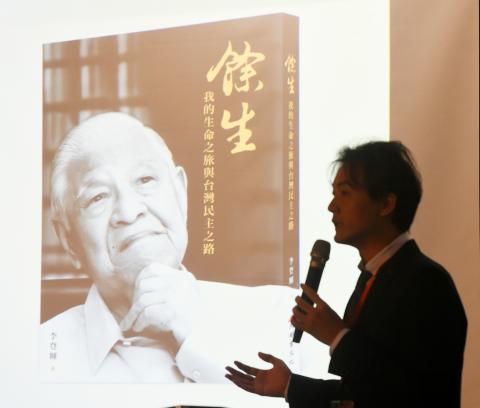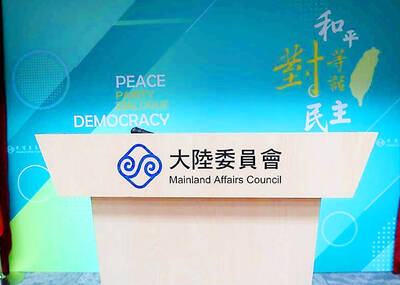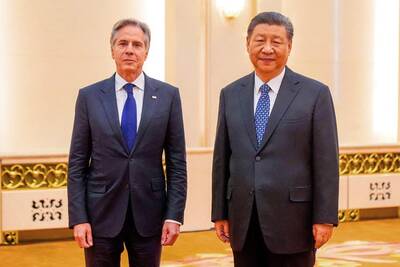In his new book, former president Lee Teng-hui (李登輝) said that the “status quo” for Taiwan means “not belonging to China,” which is why he has never backed the movement for Taiwanese independence.
According to reports in the Chinese-language United Daily Evening News, in Last Days: My Life’s Journey and the Roadmap of Taiwan’s Democratization, Lee writes that Taiwan already enjoys de jure independence, and if the president allows the conflict between pro-independence and pro-unification camps to grow, it would be to the detriment of the nation.
The report quoted Lee as writing that with the first direct presidential election in 1996, Taiwan “shook off the yoke of foreign occupation.”

Photo: Liao Chen-huei, Taipei Times
While under “foreign occupation,” many tragedies occurred — which should be properly addressed — but Taiwan must ultimately move beyond such sentiments, Lee wrote.
When a person arrived in Taiwan should not be the deciding factor in whether they are considered Taiwanese, and while history must be understood, Taiwanese must look toward the future, Lee wrote, according to the report.
Taiwan must shake off the old system, with its notions of “one China” and that the Republic of China (ROC) is a legitimate continuation of “China” from the Qing Dynasty, Lee wrote.
More than 80 percent of Taiwanese back maintaining the “status quo” between China and Taiwan, and this “status quo” is that Taiwan is independent of China, Lee wrote, according to the report.
The nation should participate in international affairs under the name of Taiwan, which should be the only point of concern, Lee wrote.
The debate over whether Taiwan is independent would only tear the nation apart if allowed to continue, and Taiwan need not make controversial comments on the matter, because it already enjoys de jure independence, Lee wrote, according to the report.
Meanwhile, Lee yesterday canceled at the last minute his appearance at a publicity event for the book at the Taipei International Book Exhibition.
The book was originally scheduled for publication before the Jan. 16 presidential and legislative elections, but the date was pushed back due to concerns that it might influence voting, Metropolitan Culture Enterprise Co Ltd & Banner Publishing House (大都會文化事業出版社) president Lin Ching-pin (林敬斌) said, adding that the title of the book was chosen by Lee.

Taiwan Semiconductor Manufacturing Co (TSMC, 台積電) on Wednesday said that a new chip manufacturing technology called “A16” is to enter production in the second half of 2026, setting up a showdown with longtime rival Intel over who can make the fastest chips. TSMC, the world’s biggest contract manufacturer of advanced computing chips and a key supplier to Nvidia and Apple, announced the news at a conference in Santa Clara, California, where TSMC executives said that makers of artificial intelligence (AI) chips will likely be the first adopters of the technology rather than a smartphone maker. Analysts said that the technologies announced on

NO RECIPROCITY: Taipei has called for cross-strait group travel to resume fully, but Beijing is only allowing people from its Fujian Province to travel to Matsu, the MAC said The Mainland Affairs Council (MAC) yesterday criticized an announcement by the Chinese Ministry of Culture and Tourism that it would lift a travel ban to Taiwan only for residents of China’s Fujian Province, saying that the policy does not meet the principles of reciprocity and openness. Chinese Deputy Minister of Culture and Tourism Rao Quan (饒權) yesterday morning told a delegation of Chinese Nationalist Party (KMT) lawmakers in a meeting in Beijing that the ministry would first allow Fujian residents to visit Lienchiang County (Matsu), adding that they would be able to travel to Taiwan proper directly once express ferry

CALL FOR DIALOGUE: The president-elect urged Beijing to engage with Taiwan’s ‘democratically elected and legitimate government’ to promote peace President-elect William Lai (賴清德) yesterday named the new heads of security and cross-strait affairs to take office after his inauguration on May 20, including National Security Council (NSC) Secretary-General Wellington Koo (顧立雄) to be the new defense minister and former Taichung mayor Lin Chia-lung (林佳龍) as minister of foreign affairs. While Koo is to head the Ministry of National Defense and presidential aide Lin is to take over as minister of foreign affairs, Tsai Ming-yen (蔡明彥) would be retained as the nation’s intelligence chief, continuing to serve as director-general of the National Security Bureau, Lai told a news conference in Taipei. Koo,

MANAGING DIFFERENCES: In a meeting days after the US president signed a massive foreign aid bill, Antony Blinken raised concerns with the Chinese president about Taiwan US Secretary of State Antony Blinken yesterday met with Chinese President Xi Jinping (習近平) and senior Chinese officials, stressing the importance of “responsibly managing” the differences between the US and China as the two sides butt heads over a number of contentious bilateral, regional and global issues, including Taiwan and the South China Sea. Talks between the two sides have increased over the past few months, even as differences have grown. Blinken said he raised concerns with Xi about Taiwan and the South China Sea, along with China’s support for Russia and its invasion of Ukraine, as well as other issues